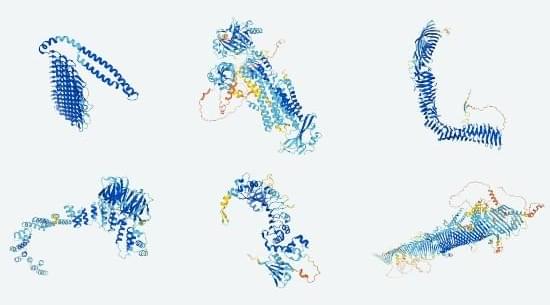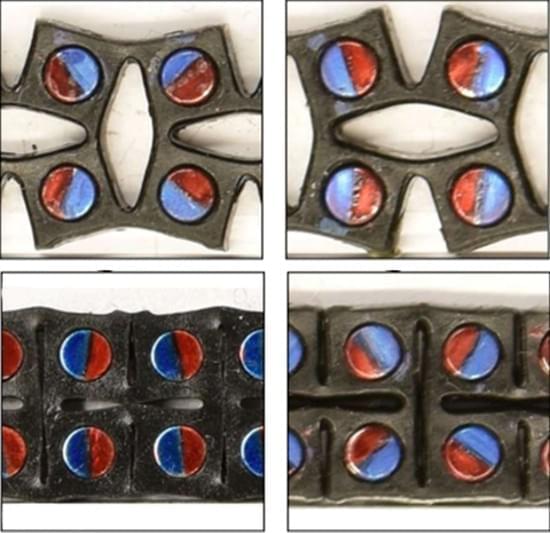Airborne pollutants including viruses, mould, bacteria, dust, and harmful gasses cause millions of deaths annually. Solutions are available.
Recent advances in AI are using deep learning to identify areas within human organs that surgeons can safely dissect before operating, machine learning to predict if patients with memory issues will develop Alzheimer’s within two years, and deep learning to analyze eye scans during routine examinations to identify patients at short-term high risk for a heart attack.
AI is being used for surgical guidance in the OR, for predicting early-onset Alzheimer’s, and through eye exams who may have a heart attack.
How will advancements in technology and our scientific understanding and discoveries impact society? Peter Diamandis picks 10 to talk about.
Research on proteins has been front and centre in our battle to defeat COVID-19. That’s why major efforts are being made to unlock the mystery of how combinations of amino acids when folded can be powerful tools in combatting diseases and more.
DeepMind in the UK and the University of Washington leading the way in proteins research to meet 21st-century problems and challenges.
The elixir of technological innovation and the information it delivers at our very fingertips every day has proven to be a Pandora’s Box unleashing misinformation, rumour, hate, selfish malfeasance, and violence. Since when did access to knowledge produce so much havoc? Because that’s what appears to be happening with COVID-19, climate change, and more.
My more recent personal experience is equally relevant. When I got COVID-19 in April 2020, it attacked the lining of my heart temporarily enlarging the upper left chamber where pulmonary veins interact with the muscle. Those veins were damaged by the virus leading to the beginning of changes to my heart rhythm and the onset of atrial fibrillation and other arrhythmias.
Three weeks before getting infected I had a full physical in preparation for upcoming knee replacement surgery. At the time I was told that my heart was healthy with no underlying medical conditions of concern. Then COVID-19 struck leading me to go to the hospital emergency where I was told that I was in danger of an imminent stroke and was now a heart patient.
There was no vaccine at the time to protect me, but today there is now, and more than one good option. So I would say to this young man, the certainty of the virus further damaging your heart is much greater than the likelihood of vaccination doing more damage to it than already is there. And I would say to his mom, please help your son find the real experts and not Internet-based influencers so that you together can separate the disinformation chaff from the knowledge wheat, and by doing so give him the best chance to survive.
Sweeney describes his conversations with the Tesla founder about the account and what he says Musk offered him to take it down.
By 2031 the ISS will have served as a continuous human habitation and microgravity lab in low-Earth orbit for more than 3 decades.
The ISS is 1,000 times closer to us than the Moon, and 600,000 times closer than Mars. To get to the latter and back safely, we need faster rocket propulsion systems.
Using the conventional chemical rocket technology we have perfected at this time, a single mission to Mars will require the launch of a mass equal to 10 ISS to be put into space. It will involve at least 30 and as many as 40 of the largest rockets we have today to put the spacecraft, crew and fuel needed for the mission. That doesn’t include adding reserves of fuel placed strategically along the route should a problem arise going to Mars and coming back. Brown states that the total cost of a single mission using this approach would exceed $80 billion using the yet-to-be-launched SLS as the primary vehicle. With SpaceX and the Starship and Heavy booster, the cost could be cut by half. But even $40 billion for a single mission seems excessive.
Using nuclear-powered propulsion systems, however, would eliminate the need to put megatons of fuel into orbit. The only time chemical rockets would be used would be in launching the crew and spaceship components to Earth orbit. That could be done in as few as three launches with the final assembled ship going to Mars and back and then being parked in Earth orbit to be used again on future missions.
What additional advantages can be derived from using nuclear? Thermal-powered nuclear is at least twice as efficient as current chemical rockets and requires a tiny fraction of the fuel to get the job done. Electric-powered nuclear starts moving the rocket slowly away from Earth and then continuously accelerates to attain peak speeds of 200,000 kilometres (120,000 miles) per hour. An electric-powered nuclear propulsion system would use even less fuel than thermal-powered nuclear and would shorten the voyage to a month.
It has elasto-magnetic properties that cause it to react to external forces or energy acting like a super rubber band.









